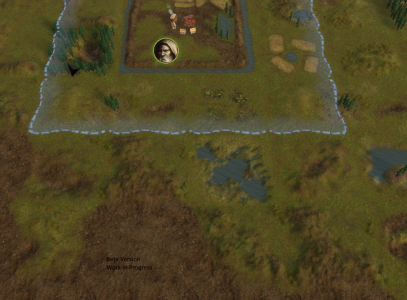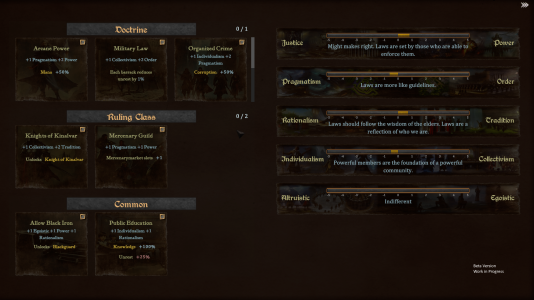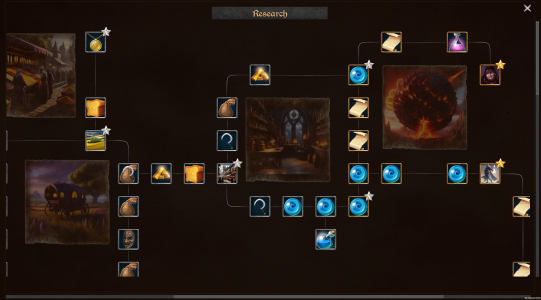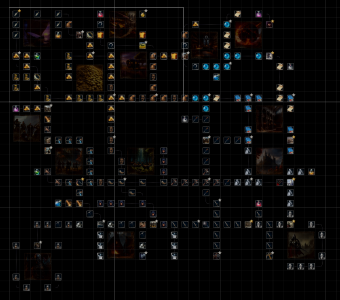Thanks for the encouraging words friends, it is time to share some more news. I have been working hard the last month to get the game ready for early access. There is still quite a lot to be done. Couple Month atleast.
Leader Development
The leader development system is the heart and soul of the game. You play as an upcoming leader with great potential. There are no books written yet about you but you are known enough that other leaders will recognize you. How you develop your leader, what choices you make and how history will remember you is up to you.
The leader system is inspired a lot by the fantasy show game of thrones. I liked the interactions and the dialogues between the leaders in the earlier seasons. I want to make an 4x game that is not just about painting the map or minmaxing, but where you feel that you are part of a living world and your decisions let empires rise and fall. In 4X games the player can create his orher own story and is not shakled to follow some scripted story. Characters and character development is great for storytelling and soI decided to combine the two.
Your leader will gain experience by combat, diplomacy or doing tasks for organizations. Whenever you have enough to experience to gain a new level your leader can increase an attribute, skill or select a new talent and thus will become more powerful. While the races(civs) you can play are predefined and all have their own lore and gameplay mechanics the leader mechanic provides you with full agency. There are no predefined classes, you can freely combine talents and skills. You can choose to start as a predefined leader from the lore or create a custom leader fromscratch. Your leader provides your empire with passive bonuses and the leaders skills are used in diplomacy and events.
Attributes
There are six attributes: Strength,Dexterity, Constitution, Intelligence, Wisdom and Charisma. Attributes main function is to make the effects of skills stronger.
Skills
There are currently about 30 Skills in the game. Most skills have two functions. They provide a passivebonus effect and they can be used in diplomacy/events. Each skill is linked to an attribute and a decent attribute score is required to make good use of a skill. The intimidation skill for example is linked to charisma. Even if you have a very low charisma you can try to intimidate the archdemon but you will have to be very lucky to succeed. Basic skills like farming or intimidation are available to every leader, but most skills need to be unlocked by talents. For example the summoning skill is unlocked by the Summoner talent.
Talents
Talents are extremly powerful and choosing your next talent is one of the most important decisions inthe game. Talents unlock skills, legendary buildings and combatabilities. Talents also make some events more likely to occur. Each Talent also has a very powerful signature ability. The Summoner talent allows to summon creatures while the Merchant talent allows you to incorporate trade villages easier into your empire.
I did not want to have a static system where the power of each skill or talent is the same every game. This often leads to some characterbuilds being a lot more viable than other builds. There are two sources of power that are created dynamically every game and make certain skills or talents more useful: jewelry and wondrous locations.
Jewelry
You can find jewelry that provides bonuses to attributes or skills. You can wear 3 jewelry items at the same. To change your jewelry you need to perform an attunement ritual which can only be done every 20 turns.
Wondrous locations (new Uniquefeatures)
On the map you can find special places of great power that have been neglected for a while. Many of these places are linked to a skill and if you rebuild these places you gain a bonus to the skill. For example the golden mountains will increase your mercantile skill.
Battle
You can send your leader into battle.The leader is always attached to a special division which act as bodyguards. The leader is basically unkillable but will flee the battle if the bodyguards are destroyed or fleeing. The leader provides bonus stats and abilities to the bodyguards. If you play a more combat oriented warrior king you probably want to join every battle but as a merchant it might be better to skip some tougher battles. But even a merchant leader can be useful in battle since merchants have the bribe ability which allows them to permanently convert an enemy unit to your side if the target can be recruited as a mercenary, has low morale, is in melee range and you have enough coin to spare.
Diplomacy and events
It is diplomacy where the leader system shines the most. To do diplomacy you use your leader skills such asintimidation, persuasion, reasoning, etc. Roleplaying are the bestwhen you have lots of options and so there are plenty of diplomaticoptions. Currently there are 35 diplomatic actions and I plan to addmore as time goes by. For most diplomatic deals you need asuccessfull skillcheck. Different diplomatic actions allow the use of different skills. So the diplomacy game of a charming merchant king is quite different from an intimidating barbarian clanchief.
Events also use the skill system. When bandits for example invade your lands you don't have to kill them.You can use different skills to deal with them. You can try to intimidate them or persuade them to attack someone else or recruit them into your army. The way it works is that if you use a skill and you fail your skillcheck after that you only have the options left to attack them or pay them gold. So you could for example specialize your leader to be really good at recruiting bandits into your army.
The world is filled with a lot of „minor nations“ like trade villages or bandit strongholds and there are a lot of interactions possible. So maybe you find a really wealthy trade village. Now you could attack them to plunder their gold and maybe later burn it down and create a city there. But positive relations with them give you gold every turn from trade and if you integrate them peacefully into your empire you get a bonus resource. So maybe you want to stay peaceful with them but still have their gold. You could try to find some bandits and persuade them to attack the wealty village. If the bandits are succussfull with their attack you can then plunder the bandit camp and take the gold from them.





